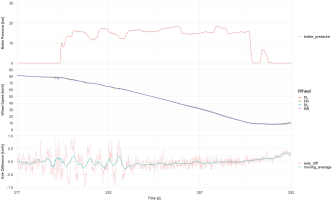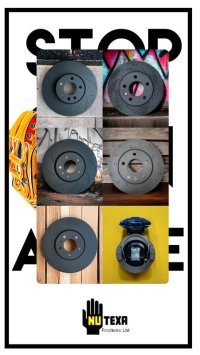Its well known that across the VAG range that Adaptive cruise eats rear discs / pads.
You are using an out of date browser. It may not display this or other websites correctly.
You should upgrade or use an alternative browser.
You should upgrade or use an alternative browser.
Why would rear brakes wear faster than front?
- Thread starter BRABUS
- Start date
Just for the fun of it, I looked at wheel speeds during a tranquil braking to an intersection in order to see if it could be determined if front or rear axle brakes more.
But... I too have got a notice about *rear* pads being worn. Big brakes at front, so maybe big brakes just don't wear as quickly as smaller rear ones. Also might explain the front-laden braking. And I don't have ACC.

- Brake pressure shows where I press the pedal
- Also shows the approach was relatively stable, just braking a little
- Individual wheel speeds are so close to each other that nothing can be really said from the wheel speed graph
- I then calculated axle speeds as averages of wheel speeds F = (FL+FR)/2 and R = (RL+RR)/2
- Plotting axle difference F-R resulted in a quite noisy signal
axle_diff - Finally I plotted moving average of
axle_diffin order to show the signal better
But... I too have got a notice about *rear* pads being worn. Big brakes at front, so maybe big brakes just don't wear as quickly as smaller rear ones. Also might explain the front-laden braking. And I don't have ACC.

I'd of said the obvious option is the brakes are binding either calipers not release properly or the handbrake mechanism is jammed. That's where I'd start before anything electronic.
@Nutexa Frictions any guidance?
I found the rear pads (and discs) wore down quicker on my T5.1. The sticking handbrake cables was the most likely reason. Also the fronts are vented and larger, so have a higher "capacity" for braking, even though they probably do more braking effort.Also check the handbrake cables aren't frayed and causing the to stick rather than sliding in and out of the outer housing, check they have free movement throughout their run, handbrake should be adjusted to 3 to 6 clicks. Lower than 3 the pads won't retract enough causing the pads to drag more than 6 the handbrake won't be effective
The rears are vented too on my T6/32I found the rear pads (and discs) wore down quicker on my T5.1. The sticking handbrake cables was the most likely reason. Also the fronts are vented and larger, so have a higher "capacity" for braking, even though they probably do more braking effort.
There’s only one pot on the rears & it’s the pad on the pot that wears, dunno if that’s significant.The rears are vented too on my T6/32
I'm pretty sure the rear discs and pads on my Caravelle are the originals, the pads have about 10% or less left and the discs will need replacing at the same time, it's done 45k miles.
The front discs and pads were replaced at 39k miles. No adaptive cruise control (well, not until 1000 miles ago).
The front discs and pads were replaced at 39k miles. No adaptive cruise control (well, not until 1000 miles ago).
Do front and rear pads have the same thickness of friction material when new?
Way back I had a 2004 Passat. That would get almost as much brake dust on the rear wheels as the front, even on long motorway journeys without using (basic) cruise control and virtually no braking. On one regular 240mile trip from Shropshire to Kent, I tried it with the ESP turned off. The result... perfectly clean rear wheels. It seems that ESP is constantly doing it's thing in the background without us knowing.
I only ever change all 4 lots of pads, rears always wear quicker than the fronts...I have ACC but never use it...it doesn't bother me why the rears wear more quickly, if a pad wears it wears...both vans have been brand new and so I can't see any mechanical failure issues ???
Wait, do they really go through disks at the same rate as pads?!?I'm pretty sure the rear discs and pads on my Caravelle are the originals, the pads have about 10% or less left and the discs will need replacing at the same time, it's done 45k miles.
I was expecting to get at least 100k out of a set of disks...
These days it seems that discs wear out quite quickly. Some blame surface corrosion which forms as vehicles are being used less frequently, others say brakes reach higher temperatures than previously due to changes in driving styles (more reliance on friction brakes rather than engine braking), increase vehicle weights, higher speeds, other systems such as traction control using the brakes, etc.Wait, do they really go through disks at the same rate as pads?!?
I was expecting to get at least 100k out of a set of disks...
I tend to replace discs every second pad change. I do my own brake pad and disc changes.
That sounds more like the rate I was expecting. Given VW costs I maybe need to get the gear to do my own, being a bit safety critical it's always a line I've not crossed but it seems dealers are more and more playing on that instinct to get work.I tend to replace discs every second pad change. I do my own brake pad and disc changes.
Did my rears last week. Pretty straightforward with minimum basic tools:-That sounds more like the rate I was expecting. Given VW costs I maybe need to get the gear to do my own, being a bit safety critical it's always a line I've not crossed but it seems dealers are more and more playing on that instinct to get work.
Wind back tool, £13 from Screwfix
21mm socket & breaker bar
12mm socket
Loctite
Jack
Axle stand/blocks
Copperslip
Wheel brace or impact gun + 19mm socket.
10mm spline bit.
Once UPS got their arse in gear & delivered the goods, it’s a couple of hours job, allowing for a tea break.
I bought axle stands, bottle jack, new sockets and the special long hex key for the calipers, a torrque wrench and performance discs and pads for the front. And the whole cost was much cheaper than getting VW to do them.That sounds more like the rate I was expecting. Given VW costs I maybe need to get the gear to do my own, being a bit safety critical it's always a line I've not crossed but it seems dealers are more and more playing on that instinct to get work.
It meant that the other week all I had to do for the rears was buy the discs and pads for £150 from Nutexa. (Except for the replacement caliper ‘cause one was seized. But again, because I had the stuff the new caliper was just an £80 job).
That sounds like the rears to me are a floating calliper and it isn't quite 'floating' as freely as it should.There’s only one pot on the rears & it’s the pad on the pot that wears, dunno if that’s significant.
It is a floating calliper & they were free/greased/corrosion freeThat sounds like the rears to me are a floating calliper and it isn't quite 'floating' as freely as it should.

Similar threads
- Replies
- 10
- Views
- 1K
- Replies
- 0
- Views
- 356
- Replies
- 6
- Views
- 566
- Replies
- 3
- Views
- 795

